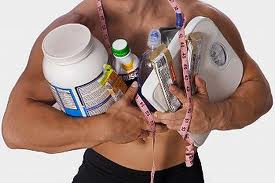Have you ever thought about your body as a collection of naturally occurring chemical reactions? Modern science has pretty much shown us this fact. The sports supplement industry, however, makes us believe they’ve studied all this research and knows what areas of our bodies become stressed during intense exercise. In response, they’ve developed every kind of supplement to enhance athletic performance. But are supplements such as sport drinks, gels, bars, or even pills effective? Do they really help an athlete go longer and stronger or is it just marketing and can these products have a negative impact on your health?
Water or Sports Drink
With all the focus on doping in professional sports as of late, especially in professional bicycling, athletes are looking for that edge to enhance their natural ability that is sharpened by constant training. That edge can be obtained through sports drinks, for one, which supposedly help with water and electrolyte replacement, both of which are lost through sweat. Physiologically speaking, this is what our body does to keep us cool. When you get that salty taste in your mouth or see white stains on your shorts during an intense work out, that is what’s happening. That is why athletes engaged in workouts over 3 hours rely on sport drinks and not just water. In fact, sports drinks tend to make you more thirsty because of the high levels of sodium and sugar. That is why pro athletes don’t drink just water because they can suffer from a condition called hypnotraemia, which can result from low sodium levels as the result of taking in too much water. So for them, electrolyte replacement is essential. For exercisers who want to get fit and lose weight, those who do workouts lasting 1 hour or less, this isn’t the case. Many studies have shown that water is enough to sustain hydration and that sports drinks only increase calories.
Supplements: Beneficial Or Not
It comes as no surprise that doctors really see no benefit from sport supplements, especially for the casual exerciser or even the “weekend warrior.” As they see it, these type drinks, as well as other supplements such as gels and bars, are full of sugars and calories that sport industry advertisers claim you need. If you are doing an hour workout every day, the food you consume as part of a balanced diet and water are fine for replenishing the electrolytes you’ve lost. The reality is that even most serious athletes don’t know what they are putting in their bodies when it comes to supplements or whether or not they are beneficial. Of course, caffeine is something we’ve all heard about. It can give you that drive and focus. That’s why it’s not a bad thing to have some coffee before a morning event. Just keep in mind it is a diuretic and might leave you with the urge to urinate frequently. Carbohydrate and protein delivered through drinks, bars, and gels are also good supplements when having enough food isn’t possible, especially those containing glucose polymers, maltodextrins and small quantities of fructose.
Side Effect of Sport Supplements
Clearly, the desire in athletes to perform better, to last longer, get fit and maintain a healthy weight is driving the sports supplement industry. As a result, it has become a 7.5 billion dollar a year business. What these athletes don’t know is that these supplements come with side effects and the benefits they think they are receiving are definitely negatives, especially when it comes to your teeth. Because of the high concentration of sugars and citric acids in sports drinks, gels, and other products, they can be 30 times more detrimental to your dental health. In fact, the sugars used in sport supplements are higher than in soft drinks. Many of them also contain High Fructose Corn Syrup, which has been proven to cause obesity and, in some cases, cancer not to mention they contain higher levels of sodium. That is why over the last few years a lot of nutrition companies have switched their focus and are specializing in producing bars and gels with organic ingredients as well as sports drinks without processed sugars and salt.
Do What Feels Right For You
As a society, we are continuously bombarded by advertising. We are told these products offer a quick solution to areas of our lives where we may feel vulnerable or not as effective. Keep in mind that the sports industry isn’t any different than any other, it is, after all, driven by businesses that want to make money, so do what feels right for you. The truth is, like in most things, common sense prevails. Treat supplements as food and read the labels and be cautious about things you don’t really understand. And remember if you are exercising moderately for an hour or less, water and the food from your diet should be enough to help you feel recovered.
Citations
Ergonenic aids: The Positives and Negatives of Supplements. (n.d.). Retrieved November 10, 2015, from http://www.pponline.co.uk/encyc/ergonenic-aids-the-positives-and-negatives-of-supplements-35847#
The Disgusting Truth about Sports Drinks Revealed… (n.d.). Retrieved November 13, 2015, from http://articles.mercola.com/sites/articles/archive/2009/04/23/sports-drinks-rot-your-teeth.aspx
Sports Drinks: More Harm Than Good? | Nutrition Wonderland. (n.d.). Retrieved November 10, 2015, from http://nutritionwonderland.com/2009/05/sports-drinks-good-or-bad/

